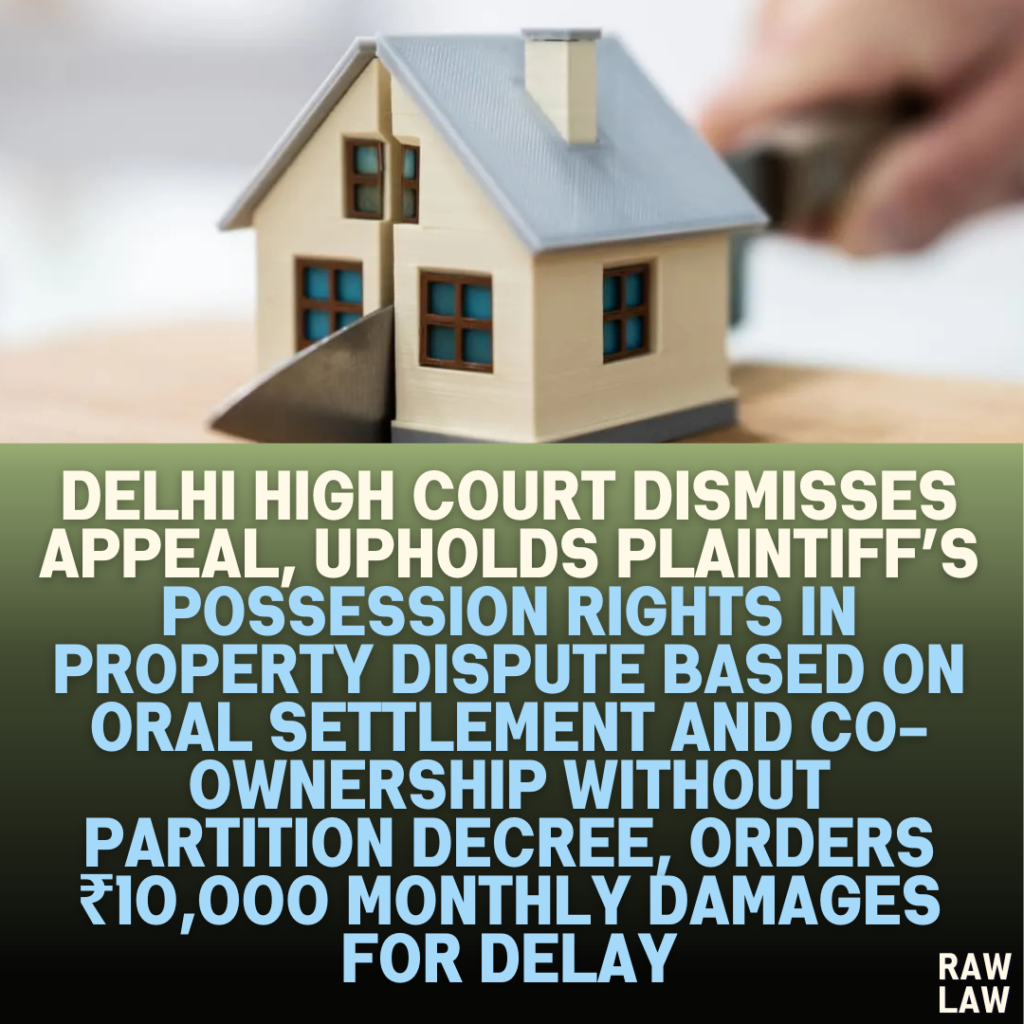Court’s Decision:
The Delhi High Court dismissed the appeal, upholding the Trial Court’s decision granting possession of the disputed property to the plaintiff, a co-owner, without requiring a formal partition decree. The court found that the evidence established the plaintiff’s constructive possession and legal entitlement to the property. The defendant’s claims of exclusive possession were rejected.
Facts:
The plaintiff and the defendant were co-owners of a property, which the plaintiff had originally purchased in 1972, later including his brother (now deceased) as a co-lessee out of love and affection. The property was constructed in two portions, with both families occupying separate parts as per a family arrangement in 1981. Following disputes over possession, the plaintiff alleged that the defendant had unlawfully occupied his portion of the property and sought possession, damages, and an injunction.
The Trial Court decreed in favor of the plaintiff, granting him possession of the front portion of the property marked in red, as well as damages of ₹5,000 per month from 2007 until the date of the decree.
Issues:
- Whether a co-owner can seek possession without a partition decree.
- Whether the Trial Court erred in decreeing possession based on alleged inconsistencies in the evidence.
Petitioner’s Arguments:
The plaintiff argued that the suit property was held jointly but had been divided into two portions as per an oral family settlement. The plaintiff maintained his right over the front portion of the property and asserted that the defendant had unlawfully occupied it.
Respondent’s Arguments:
The defendant contended that no partition had ever taken place and that the property remained undivided, making the possession claim invalid without a partition decree. The defendant also argued that the plaintiff had never resided in the disputed portion of the property and that any claim to exclusive possession was unfounded.
Analysis of the Law:
The court examined the principles governing co-ownership and family arrangements. It emphasized that co-owners are entitled to possession unless ousted by a valid legal procedure. The court held that the plaintiff, as a co-owner, could claim possession without a formal partition decree, especially given the oral settlement and division of the property established by the evidence.
Precedent Analysis:
The court referred to the legal precedent that oral family settlements can be binding and enforceable, especially when corroborated by documentary and oral evidence. It rejected the defendant’s reliance on cases that required partition decrees, finding them inapplicable under the specific facts of this case.
Court’s Reasoning:
The court reasoned that the plaintiff had successfully established his co-ownership and possession of the property through a combination of documentary evidence, including the perpetual lease deed and site plan, as well as oral testimony from family members and neighbors. The defendant failed to provide sufficient evidence to rebut the plaintiff’s claims of an oral settlement and the subsequent division of the property.
Conclusion:
The court upheld the Trial Court’s decree, granting possession to the plaintiff. It dismissed the appeal, ordering the defendant to comply with the possession order and pay damages of ₹10,000 per month if the handover was delayed beyond the prescribed period.
Implications:
This judgment reaffirms the principle that co-owners can claim possession of their share of the property without a formal partition decree, especially in cases where oral family arrangements or settlements have been established. It also clarifies the rights of co-owners to seek legal recourse against unlawful occupation by other co-owners.




Pingback: Kerala High Court Confirms Conviction in Cheque Bounce Case Under Section 138 Negotiable Instrument Act, Modifies Sentence Citing Legal Error in Enhanced Punishment by Sessions Court - Raw Law
Pingback: Supreme Court’s Comprehensive Review of Child Marriage Prevention in India: Criticizes Poor Enforcement, Calls for Strengthened CMPO Appointments and Comprehensive Awareness Campaigns - Raw Law